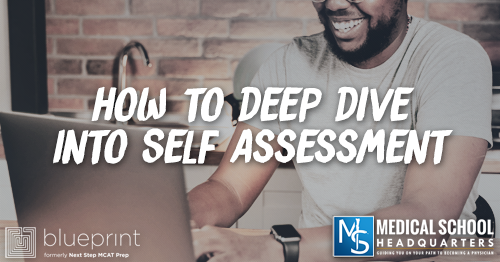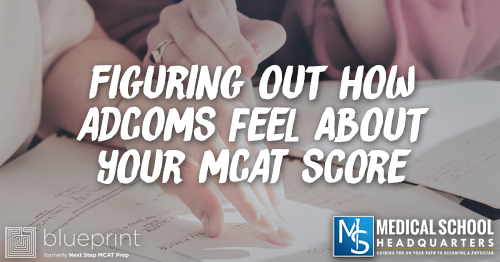Apple Podcasts | Google Podcasts
Session 317
Meron skipped the MCAT via an early assurance program. An ambassador for Blueprint MCAT, Meron got into an early assurance program. Today, we’re going to talk about the benefits and the drawbacks. The MCAT is typically a big draw for these early assurance programs, specifically not having to take them, although most of them still do.
Follow Meron on Instagram @medwmeron. If you would like to follow along on YouTube, go to premed.tv.
Listen to this podcast episode with the player above, or keep reading for the highlights and takeaway points.
[01:59] The Decision to Become a Physician
Meron’s decision to become a physician was influenced by her lifetime experiences. In high school, she volunteered at a hospital, not with the specific intention of becoming a physician, but as a common community service experience. However, during her time there, she noticed a significant lack of diversity in medicine, particularly the absence of black physicians. This realization sparked her curiosity about the reasons behind this disparity.
In college, Meron pursued a major in public health, which further deepened her interest in medicine. She not only wanted to explore the field of public health but also desired to make a difference in global health. Her experiences in Ethiopia, where she witnessed various healthcare issues affecting her family and the country as a whole, motivated her to contribute as a physician.
Throughout her journey, Meron continued to volunteer, engage in research, and participate in regular pre-med activities such as clinical work. These experiences solidified her passion for medicine and reinforced her determination to pursue it as a career.
Meron’s decision to become a physician was not driven by a single defining moment. It was rather a culmination of experiences that shaped her interest and dedication to promoting diversity in medicine and addressing healthcare challenges on a global scale.
[04:03] Overcoming Stereotypes and Breaking Barriers
Meron’s experiences in Ethiopia and her mentor’s guidance helped her realize that becoming a physician was indeed possible, regardless of her background. With the belief instilled in her by her parents that she could achieve anything she set her mind to, Meron was motivated to pursue a career in medicine and contribute to improving healthcare, both locally and globally.
Defying Expectations
As Meron embarked on her educational journey, she encountered stereotypes and preconceived notions that questioned her ability to succeed. Being a first-generation, underrepresented student, she witnessed firsthand the biases and judgments that society often places on individuals who don’t fit the traditional mold. These experiences only strengthened Meron’s resolve to defy expectations and prove that her background did not define her capabilities.
Meron’s involvement in a nonprofit organization dedicated to empowering first-generation, underrepresented students provided her with a platform to address these stereotypes. Through mentoring and tutoring, she seized the opportunity to inspire and uplift others, sharing her own story of resilience and perseverance. Meron knew that by challenging these stereotypes and providing support to those facing similar barriers, she could help pave the way for a more inclusive and diverse healthcare workforce.
The Power of Mentorship
Although Meron didn’t have explicit conversations with a physician mentor about the challenges she faced, she drew inspiration from their shared determination to overcome adversity. Witnessing the impact that her mentor had on patients’ lives, Meron realized that she too could make a difference through medicine.
In her mentor’s guidance, she found the encouragement and support necessary to pursue a career in healthcare, despite the obstacles she encountered along the way.
Meron’s experiences in Ethiopia, combined with her passion for education and mentorship, propelled her towards her goal of becoming a physician. She recognized the importance of diversity in medicine and the need to break down barriers that hinder underrepresented individuals from pursuing their dreams. With her unwavering determination, Meron embarked on her journey, driven by the belief that she could contribute to improving healthcare, not only in her local community but also on a global scale.
Today, Meron stands as a testament to the power of resilience, mentorship, and the belief that one’s background should never limit their aspirations. As she continues her journey in medicine, Meron remains committed to raising awareness about the challenges faced by underrepresented individuals. She continues to advocate for a more inclusive and equitable healthcare system. Her story serves as an inspiration to all those who dare to dream, showing that with determination and support, anything is possible.
[06:11] Embracing the Accelerated Path
When Meron applied for medical school during her sophomore year, she knew that everything about her thought process and decision-making would have to be accelerated. The idea of becoming a physician at such a young age required her to deeply reflect on whether she could truly envision herself in this role. With a multitude of medical specialties to consider, Meron decided to gain firsthand experience by shadowing doctors in three different fields.
Gaining First-Hand Experience
As she immersed herself in the world of medicine, Meron questioned her own abilities and potential. Could she handle the responsibilities of being a physician? Would she find fulfillment in this career path? These doubts propelled her to explore various specialties, seeking clarity and alignment with her own values and aspirations.
Discovering Beyond Technical Aspects
Throughout her shadowing experiences, Meron discovered that being a physician went beyond the technical aspects of medicine. It was about serving others, making a positive impact, and embodying compassion. These qualities resonated deeply with Meron’s personality and upbringing. Growing up with parents who instilled in her a strong desire to help others, she realized that her values and innate inclination toward serving people aligned perfectly with the role of a physician.
A Leap of Faith
With this newfound clarity, Meron made the decision to apply to medical school, entrusting her fate to a higher power. She understood that embarking on this journey would require dedication, perseverance, and a deep belief in herself and her abilities. By putting her faith in God and surrendering to the unknown, Meron took a leap of faith, ready to discover if becoming a physician was indeed her calling.
With determination as her driving force, Meron was ready to embark on a lifelong commitment to healing, caring, and making a difference in the world of medicine.
[07:47] Applying to FlexMed
Doing the Research
When Meron decided to apply to FlexMed, she took a proactive approach to gather information and make an informed decision. After stumbling upon information about the program while browsing the internet, Meron listened to a podcast episode that provided valuable insights into FlexMed. This podcast episode became a catalyst for her interest and further exploration.
Curiosity piqued, Meron continued her research, delving deeper into the details of the FlexMed program. It was during this time that her roommate shared the application with their group chat, coincidentally amidst the pandemic-induced quarantine. With ample free time on hand, Meron seized the opportunity to thoroughly investigate the program’s requirements and application process.
A Backup Plan
Meron recognized that applying to FlexMed presented a unique opportunity, as it allowed her to maintain a backup plan by applying through the traditional route if needed. With this mindset, she approached the application with a sense of excitement and determination. However, she remained realistic and continued her MCAT studies diligently, unsure of the outcome but determined to give it her best effort.
As the application process unfolded, Meron’s hard work and dedication paid off when she received an acceptance letter. This pivotal moment affirmed her belief in the power of taking chances and pursuing unconventional paths.
Despite having the option to explore other schools, Meron understood the significance of committing to FlexMed’s binding offer. Hence, she made a well-informed decision after conducting extensive research on the institution.
Joining a Community and Inspiring Others
Choosing to accept the acceptance at FlexMed was not a decision Meron took lightly. She considered the school’s values, curriculum, and overall fit with her aspirations and goals.
By approaching this commitment with seriousness and thoroughness, Meron ensured that her choice aligned with her vision for her future in medicine.
With her acceptance to FlexMed, Meron was not only embarking on an educational journey. She was also joining a community that shared her enthusiasm for breaking the mold and challenging conventional norms in the field of medicine. Her experience serves as an inspiration to others, emphasizing the importance of seizing opportunities, conducting thorough research, and making informed decisions when it comes to shaping one’s future.
[09:48] The Benefits of FlexMed
One of the key benefits of FlexMed is the flexibility it offers. Unlike traditional pre-medical paths, FlexMed allows students to pursue their passions and interests outside of the sciences. This program provides students with ample free time to explore other academic areas and engage in extracurricular activities that align with their personal goals.
Additionally, FlexMed waives certain pre-medical requisites, such as organic chemistry, biochemistry, and physics. This allows students to focus on a broader range of subjects during their undergraduate studies. This flexibility not only encourages a well-rounded education but also gives students the opportunity to delve deeper into their chosen fields of interest.
'The thing that I really appreciated about FlexMed is the whole idea of the flexibility behind it.'Click To TweetAnother advantage of FlexMed is the freedom from the MCAT requirement. While many medical school applicants spend a significant amount of time preparing for and taking the MCAT, FlexMed relieves students of this additional stress. Instead, they can concentrate on their coursework, research, and personal development. This exemption from the MCAT allows students to take a more holistic approach to their education and prioritize their growth in various areas beyond standardized test performance.
[13:06] The FlexMed Application Process
The FlexMed application process begins in August and the deadline to apply is typically in mid-January. Applicants are required to submit the FlexMed application, along with their high school transcript and college transcript (including fall semester sophomore year grades).
Additionally, applicants need to provide three letters of reference and their SAT or ACT scores. It’s important to note that there is no advantage in applying early as applications are only reviewed after January 15th.
The program receives a significant number of applications each year, interviews over 100 students, and extends admission offers to approximately 30 to 60 applicants.
Successful applicants often have strong academic records, and compelling essays, and demonstrate a genuine interest in pursuing a career in medicine.
[16:09] The Interview and Acceptance
Meron’s experience with the FlexMed acceptance process was filled with a mix of excitement and nervousness. When Meron received the invitation for an interview, they were overjoyed and celebrated with their roommate by going out to eat. However, the actual acceptance was a bit nerve-wracking for Meron. They were part of a group chat where others were sharing their interview and acceptance updates, creating a lot of chatter and anticipation.
When Meron received their acceptance email, they immediately FaceTimed their dad, who had been a strong supporter and had prayed over their application. Wanting to share the moment with him, Meron asked him to double-check the email to ensure there wasn’t any misinterpretation.
Later, they called their mom, who advised caution before completely discarding their MCAT books, suggesting that they confirm the acceptance details. As the first in their family to attend college, the news brought immense joy to everyone involved and marked a significant milestone in Meron’s journey.
[17:47] Exploring the Diversity of Early Assurance Programs
Different early assurance programs have varying requirements and features. Some may be binding while others are not, and some programs may impose stricter regulations once accepted.
One notable aspect of the FlexMed program is its flexibility in allowing students to take gap years after completing college. This can be advantageous for those who desire additional time off.
FlexMed even provides the opportunity for further pursuits after graduation. This unique feature sets FlexMed apart from other medical assurance programs. Additionally, the participating schools are located in different regions. Some programs exclusively accept students from their own universities, which works favorably for those institutions.
'FlexMed is really good at accepting students from all states and all backgrounds.'Click To Tweet[20:14] Exploring Flexibility in FlexMed’s Course Requirements and Student Experiences
There may initially be concerns about Meron’s lack of recent experience in rigorous hard sciences. However, it seems that there is a reason behind the flexibility of the FlexMed program regarding these classes. It is not mandatory for students to take them.
Meron had the opportunity to speak with current FlexMed students who attend Sinai, which was fortunate. They discussed whether Meron should consider taking additional science classes or studying for the MCAT in preparation.
Surprisingly, these students assured Meron that they were able to succeed without taking extra courses or participating in the summer enrichment program. Some of them even graduated last year. These experiences indicate that success in FlexMed is achievable without strictly adhering to traditional science requirements.
[23:45] Key Considerations for Choosing a FlexMed Program: MCAT Requirements and Researching Schools
When deciding on a FlexMed program, Meron offers valuable advice for prospective students. Firstly, it’s important to note that not all early assurance programs bypass the MCAT. Some programs may still require students to take the MCAT, albeit with potentially lower score expectations to maintain their eligibility.
'Not all early assurance programs bypass the MCAT. There's some that still assume that you will take the MCAT.'Click To TweetSecondly, thorough research of the school is crucial before applying. This commitment will shape the next four years of your life and potentially even span into residency. Meron emphasizes the significance of delving into every aspect of the school, beyond just the interview season. This research will provide insight into the school’s environment and resources, aiding in making an informed decision.
Networking with current students can also provide valuable firsthand knowledge and experiences. By networking and conducting thorough research, prospective students can make an educated choice about the FlexMed program that aligns with their aspirations and goals.
[25:48] Empowering Students through Social Media
Meron’s journey into the world of social media began with a specific goal in mind. She started using TikTok as a platform to inform more students about the FlexMed program. Despite attending Hopkins, where many pre-med students study, Meron noticed that there was a lack of awareness about FlexMed among her peers.
As an underrepresented and first-generation student herself, she felt compelled to spread the word about this opportunity to other students who may come from similar backgrounds.
Meron recognized the educational inequality gap and believed that sharing information about FlexMed could help bridge that gap.
Her first TikTok video, which lasted just five seconds, simply stated that interested students should apply to FlexMed if they wanted to bypass the MCAT. From there, her content expanded to include advice for incoming freshmen interested in pursuing the pre-med journey or applying to medical school. Through her social media presence, Meron aimed to empower and support students on their educational paths
[29:08] Final Words of Wisdom
In her final words of wisdom, Meron emphasizes the importance of taking action and applying for opportunities. She encourages students not to let fear hold them back, highlighting that the worst outcome is receiving a rejection.
Meron firmly believes that financial constraints should not discourage individuals from applying, as there are various resources and fee waivers available. She shares her personal experience of contacting admissions offices and successfully obtaining an application waiver.
Meron’s advice resonates with the idea that seeking assistance and exploring different avenues can open doors to unexpected possibilities. She urges students to have faith in themselves and their abilities, underscoring that with determination, anything is achievable.
Links:
Follow Meron on Instagram @medwmeron
SEARCH SITE
SEARCH SITE
LISTEN FOR FREE












